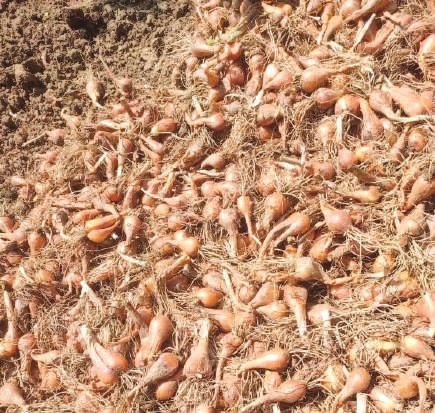Bandipora, May 06: Kashmiri cuisine is known for its rich and complex flavors, as well as its use of local ingredients and traditional cooking techniques. One of the key ingredients that helps to give many Kashmiri dishes their unique taste is spring onion, or Praan as it is known in the local language. This versatile vegetable is used in a wide range of dishes, from soups and stews to curries and kebabs.
The use of spring onion in Kashmiri cuisine dates back centuries, and is closely tied to the region’s agricultural traditions. Kashmir is known for its fertile land and favorable climate, which has long made it a hub for agriculture. Farmers in the region have been growing spring onion for generations, using it as a key ingredient in their traditional dishes.
However, it wasn’t until the 14th century that spring onion really began to gain prominence in Kashmiri cuisine. This was thanks to the Mughal Emperor Akbar, who was a great lover of Kashmiri food. Akbar’s court was known for its lavish feasts, which featured a wide range of dishes, many of which were made with spring onion.
Over time, spring onion became an essential part of Kashmiri cuisine, particularly the elaborate wazwan feasts that are served at weddings and other special occasions. In fact, no wazwan feast is considered complete without the addition of spring onion, which is used to add a fresh, aromatic flavor to the rich and spicy dishes that make up the feast.
Buthoo, a picturesque village located in the North Kashmir’s Bandipora district of Jammu and Kashmir, is known for its beautiful natural surroundings and for producing a highly sought-after ingredient of Kashmiri cuisine: organic spring onion. This humble vegetable, with its delicate flavor and crisp texture, plays a crucial role in adding aroma and depth of flavor to the famous Kashmiri wazwan, a traditional multi-course feast that is an essential part of the region’s culinary heritage.
The organic spring onions produced in Bandipora are prized for their distinctive flavor and aroma, which is due to the unique soil and climate conditions in the area. The onions are typically harvested in the late spring, when they are at their most tender and flavorful. They are then carefully cleaned and packaged for sale, with many of them finding their way to the bustling markets of Srinagar.
The farmers of Buthoo village mainly cultivate the spring onion without use of any pesticides or any other fertilizer. It produces 1500 quintals of spring onion annually, highest production by any village in J&K.
Mohd Shafi Reshi, a farmer who annually sells five to ten quintals of spring onion told Rising Kashmir that their spring onions are the lifeblood of Kashmiri cuisine, especially the Wazwan feast. “It makes me proud to know that our hard work is contributing to preserving our cultural heritage and promoting our local cuisine”, he said.
Shafi said that farming spring onions has been a lucrative business for them and they earn handsomely from selling their produce and are grateful for the opportunity to support their families and community.
“Being the highest producing village of spring onions in J&K is a great honor for us. We take pride in the quality of our onions and the role they play in the food culture of our region. It’s a testament to our hard work and dedication”, Mohd Yousuf Reshi said.
For the farmers of Buthoo, growing organic spring onions is not just a way to make a living, but a way to preserve their traditional way of life and honor their ancestors. They take great pride in the quality of their onions, which are grown using sustainable and environmentally-friendly methods. These onions are also a source of cultural pride for the people of Kashmir, who see them as a symbol of the region’s rich agricultural heritage.
Absul Gani Reshi, another farmer said that growing spring onions is not just a means of earning a livelihood for them but a way of honoring their ancestors and preserving the legacy they left behind. “We take great pride in farming these onions organically and maintaining their quality and taste”, he added.
“For us, cultivating spring onions is more than just a job. It’s a passion that we’ve inherited from our forefathers. We want to keep this tradition alive and ensure that the next generation can benefit from the knowledge and expertise passed down to us”, Gani said.
“As farmers, we understand the importance of sustainable farming practices. By producing spring onions organically, we’re not only ensuring the health and safety of our customers but also preserving the environment for future generations. It’s a responsibility that we take seriously”, Shahid Reshi another young farmer said.
The story of spring onion in Kashmiri cuisine is a fascinating one, rich with history and cultural significance. From its humble beginnings as a staple ingredient in local dishes to its current status as a highly prized culinary treasure, spring onion has played an important role in shaping the cuisine and culture of this beautiful region. And for lovers of Kashmiri food, the organic spring onions of Bandipora remain an essential ingredient, adding a touch of freshness and aroma to every dish they grace.
Bandipora’s Buthoo Village, Adding Aroma to Kashmiri “Wazwaan”

Leave a Comment
Leave a Comment







